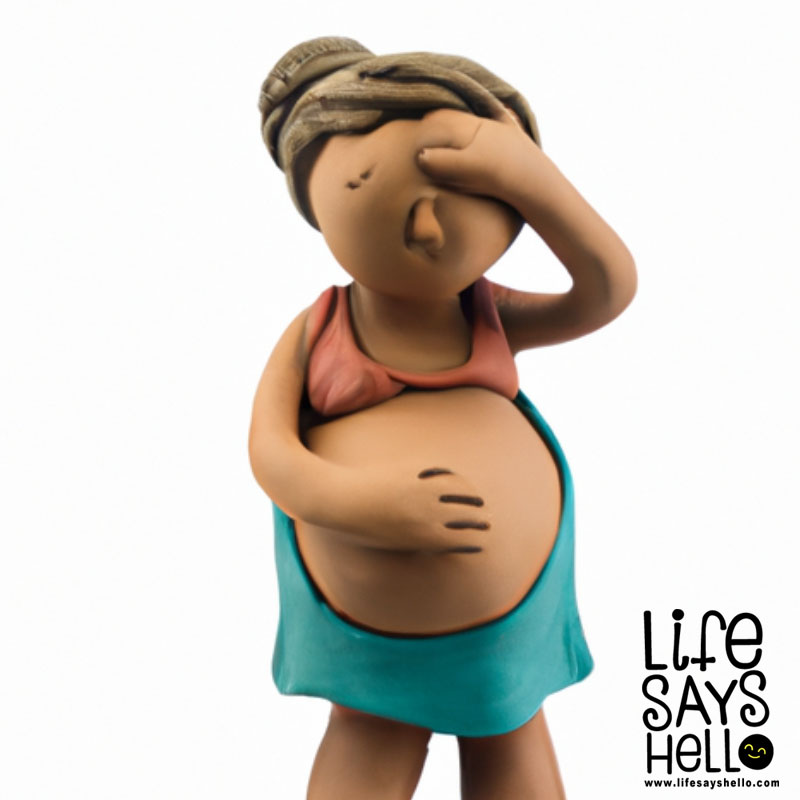Natural Remedies for Anxiety During Pregnancy: A Comprehensive Guide to Soothing the Journey

Pregnancy is a beautiful and miraculous journey, but it can also be a time of heightened anxiety and stress for expectant mothers. With so many changes happening in your body and life, it's no wonder that feelings of worry and uncertainty can creep in. In this comprehensive guide, we'll explore natural remedies and lifestyle changes that can help alleviate anxiety during pregnancy, ensuring a smoother and more enjoyable experience for both you and your baby.
Pregnancy is a time of joy, excitement, and anticipation for most women. However, it can also be a period of increased anxiety and stress as expectant mothers navigate the many physical, emotional, and lifestyle changes that accompany this life-altering event. Anxiety during pregnancy is not uncommon, and it's essential to address it for the well-being of both the mother and the baby. In this article, we'll delve into the causes of anxiety during pregnancy, common symptoms, and how it can affect your pregnancy and baby. We'll also discuss various natural remedies and lifestyle changes that can help alleviate anxiety and promote a more positive and relaxed pregnancy experience.
Understanding Anxiety During Pregnancy
Causes of Anxiety During Pregnancy
There are several reasons why a woman may experience anxiety during pregnancy, including:
Hormonal changes: The fluctuation of hormones during pregnancy can significantly impact mood and emotions, leading to increased anxiety levels.
Physical discomfort: Pregnancy can bring about various physical discomforts, such as morning sickness, back pain, and fatigue, which can contribute to feelings of anxiety.
Fear of the unknown: For first-time mothers, the uncertainty and fear of the unknown can be a significant source of anxiety.
Concerns about the baby's health: Worrying about the baby's well-being and potential complications can cause anxiety for expectant mothers.
Financial and lifestyle changes: Adjusting to new financial responsibilities and lifestyle changes can also contribute to feelings of anxiety during pregnancy.
Common Symptoms and Signs
Anxiety during pregnancy can manifest in various ways, with some of the most common symptoms and signs including:
- Persistent worry or fear
- Restlessness or agitation
- Irritability and mood swings
- Difficulty concentrating or making decisions
- Sleep disturbances, such as insomnia or nightmares
- Physical symptoms, such as headaches, muscle tension, or stomachaches
How Anxiety Can Affect Pregnancy and the Baby
If left unaddressed, anxiety during pregnancy can have negative consequences for both the mother and the baby. Some potential effects of untreated anxiety during pregnancy include:
- Increased risk of preterm birth or low birth weight
- Higher likelihood of postpartum depression or anxiety
- Difficulty bonding with the baby
- Potential impact on the baby's cognitive, emotional, and behavioral development
Given these potential risks, it's crucial to find effective ways to manage anxiety during pregnancy to ensure a healthy and positive experience for both the mother and the baby.
Natural Remedies for Anxiety During Pregnancy
There are several natural remedies and techniques that expectant mothers can use to help alleviate anxiety during pregnancy. These remedies are generally safe and can be easily incorporated into your daily routine.
Deep Breathing Exercises
Deep breathing exercises, such as diaphragmatic breathing or the 4-7-8 technique, can help activate the body's relaxation response and reduce anxiety levels. To practice diaphragmatic breathing, follow these steps:
- Sit or lie down in a comfortable position.
- Place one hand on your chest and the other on your abdomen.
- Breathe in slowly through your nose, allowing your abdomen to rise as you fill your lungs with air.
- Exhale slowly through your mouth, allowing your abdomen to fall.
- Repeat this process for several minutes, focusing on the rise and fall of your abdomen as you breathe.
Progressive Muscle Relaxation
Progressive muscle relaxation (PMR) is a technique that involves tensing and relaxing different muscle groups to promote overall relaxation and reduce anxiety. To practice PMR, follow these steps:
- Find a quiet, comfortable place to sit or lie down.
- Starting with your feet, tense the muscles for five seconds, then relax them for 15-20 seconds.
- Move up to your calves, thighs, buttocks, abdomen, chest, arms, hands, and face, tensing and relaxing each muscle group in turn.
- Once you've completed the entire sequence, take a few deep breaths and enjoy the feeling of relaxation throughout your body.
Prenatal Yoga
Prenatal yoga is a gentle form of exercise designed specifically for expectant mothers. It combines stretching, breathing exercises, and relaxation techniques to help reduce anxiety, improve sleep, and increase overall well-being during pregnancy. Many yoga studios offer prenatal yoga classes, or you can find instructional videos online to practice at home.
Meditation and Mindfulness Techniques
Meditation and mindfulness techniques can help you focus your attention on the present moment and cultivate a sense of inner calm and relaxation. Some popular meditation and mindfulness practices for reducing anxiety during pregnancy include:
- Guided meditation: Listening to a recorded meditation that guides you through a relaxation exercise or visualization.
- Mindfulness-based stress reduction (MBSR): A structured program that combines meditation, yoga, and mindfulness techniques to reduce stress and anxiety.
- Loving-kindness meditation: A practice that involves focusing on cultivating feelings of love and compassion for yourself and others.
Aromatherapy and Essential Oils
Aromatherapy, the use of essential oils for therapeutic purposes, can help promote relaxation and reduce anxiety during pregnancy. Some essential oils that are considered safe for use during pregnancy include lavender, chamomile, and ylang-ylang. You can use these oils in a diffuser, add a few drops to a warm bath, or mix them with a carrier oil for a relaxing massage.
Herbal Teas and Supplements
Certain herbal teas and supplements can help alleviate anxiety during pregnancy, but it's essential to consult with your healthcare provider before using any herbal remedies. Some herbs that are considered safe for use during pregnancy include:
- Chamomile: Known for its calming properties, chamomile tea can help promote relaxation and reduce anxiety.
- Lemon balm: This herb has a mild sedative effect and can help reduce anxiety and promote sleep.
- Passionflower: Although more research is needed, some studies suggest that passionflower may help reduce anxiety during pregnancy.
Acupuncture and Acupressure
Acupuncture and acupressure are traditional Chinese medicine techniques that involve stimulating specific points on the body to promote relaxation and alleviate anxiety. Some studies suggest that acupuncture may be effective in reducing anxiety during pregnancy, but more research is needed. If you're interested in trying acupuncture or acupressure, be sure to consult with a licensed practitioner who has experience working with pregnant women.
Lifestyle Changes to Reduce Anxiety
In addition to natural remedies, there are several lifestyle changes that expectant mothers can make to help reduce anxiety during pregnancy.
Regular Exercise and Physical Activity
Engaging in regular exercise and physical activity can help release endorphins, the body's natural feel-good chemicals, and reduce anxiety levels. Aim for at least 30 minutes of moderate-intensity exercise, such as walking, swimming, or prenatal yoga, most days of the week.
Balanced and Nutritious Diet
Eating a balanced and nutritious diet can help stabilize your mood and reduce anxiety during pregnancy. Focus on consuming a variety of whole foods, including fruits, vegetables, whole grains, lean proteins, and healthy fats. Be sure to get enough essential nutrients, such as iron, calcium, and omega-3 fatty acids, which are crucial for both your health and your baby's development.
Adequate Sleep and Relaxation
Getting enough sleep and taking time to relax is essential for managing anxiety during pregnancy. Aim for 7-9 hours of sleep each night and establish a regular sleep schedule. Create a relaxing bedtime routine, such as taking a warm bath, reading a book, or practicing deep breathing exercises, to help signal to your body that it's time to wind down.
Connecting with a Support Network
Having a strong support network can help alleviate anxiety during pregnancy. Reach out to friends, family members, or other expectant mothers for emotional support and practical advice. Consider joining a prenatal class or support group to connect with other women who are going through similar experiences.
Reducing Caffeine and Sugar Intake
Excessive caffeine and sugar intake can contribute to anxiety during pregnancy. Try to limit your consumption of caffeinated beverages, such as coffee, tea, and soda, and opt for decaffeinated or herbal alternatives. Be mindful of your sugar intake, as well, and choose healthier snacks and treats when possible.
Limiting Exposure to Stressors and Triggers
Identify and limit your exposure to stressors and triggers that contribute to your anxiety during pregnancy. This may include setting boundaries with work or personal commitments, reducing your consumption of negative news or social media, or seeking help with household chores and responsibilities.
When to Seek Professional Help
While natural remedies and lifestyle changes can be effective in managing mild to moderate anxiety during pregnancy, it's essential to recognize when your anxiety becomes unmanageable and seek professional help. If you're experiencing persistent or severe anxiety that interferes with your daily life, it's crucial to discuss your concerns with your healthcare provider. They can help determine the best course of action, which may include therapy, support groups, or medication if necessary.
Conclusion
Managing anxiety during pregnancy is essential for the well-being of both the mother and the baby. By incorporating natural remedies and lifestyle changes into your daily routine, you can promote a more relaxed and enjoyable pregnancy experience. Remember to prioritize your mental health and well-being and seek professional help if your anxiety becomes unmanageable. With the right support and tools, you can navigate this incredible journey with confidence and ease.




Comments